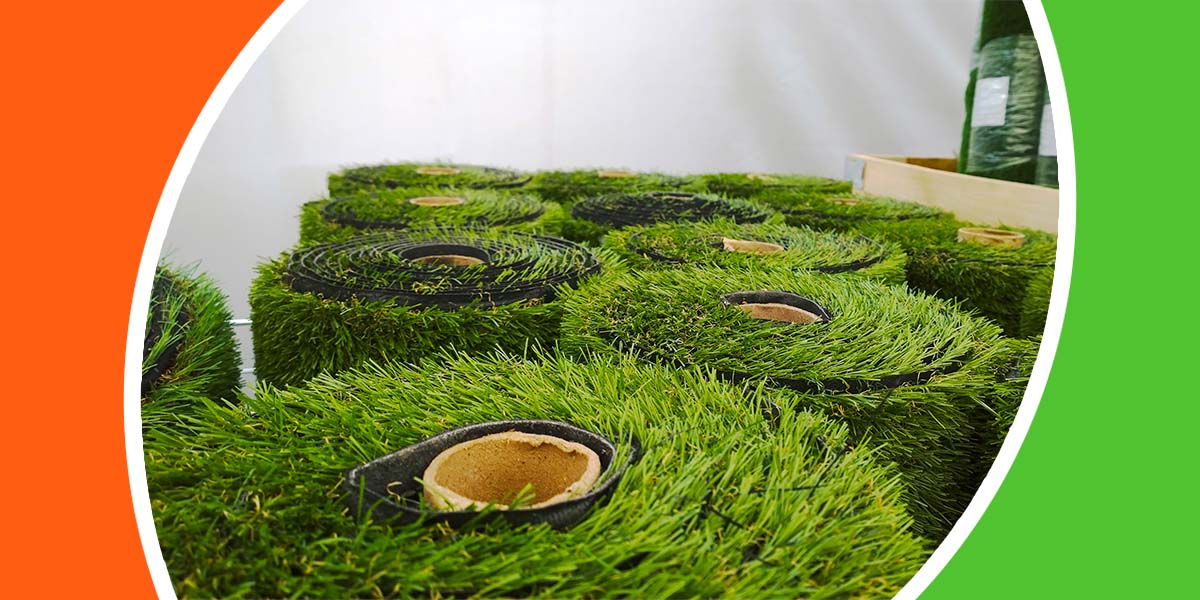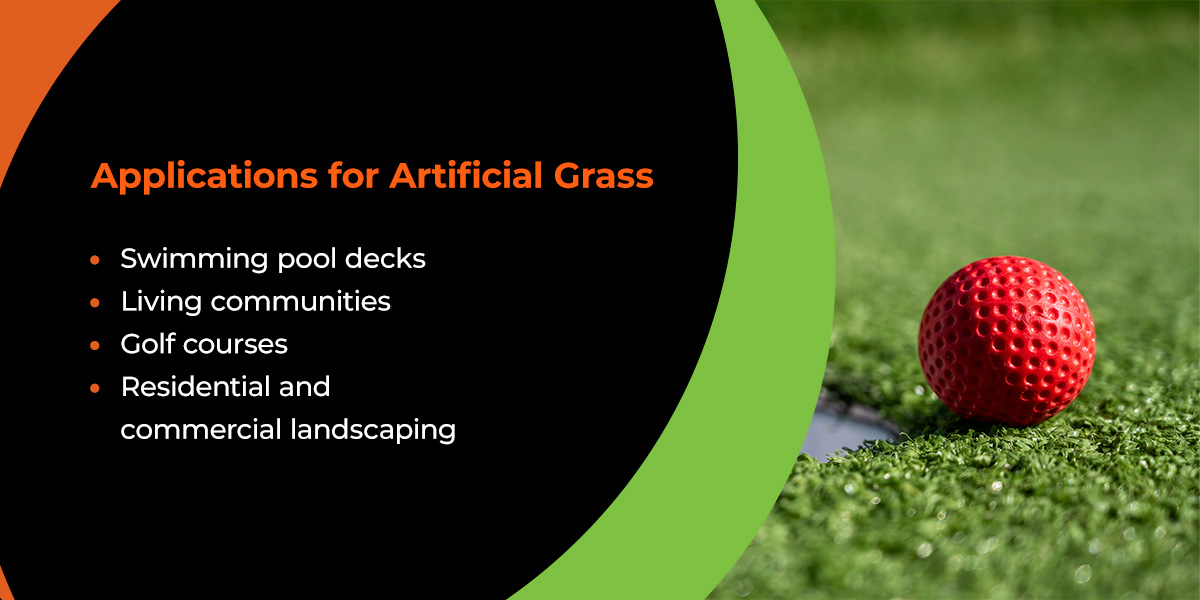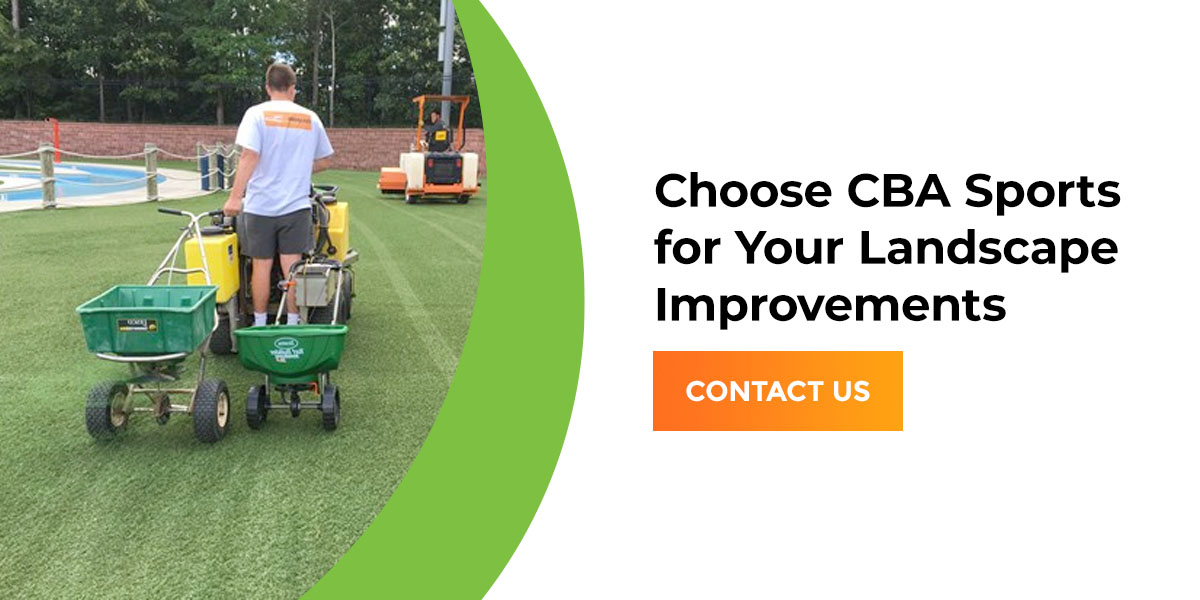
You might have read this heading and asked yourself, “Are they not the same thing?” Though it seems that way, there are distinct differences between artificial turf and artificial grass, and we’re here to explain. First, it helps to differentiate between the two terms, as they are often used interchangeably.
Read on for more about artificial grass vs. turf, applications and advantages for both, and how CBA Sports can help you decide on the right one for your home.
Table of Contents
Differences Between Artificial Turf and Artificial Grass
Artificial turf — or simply “turf” — is a type of synthetic grass that covers a sports field or a larger landscaping area, such as an estate or playground. You may be familiar with athletes calling their field the “turf,” or perhaps you’ve heard of AstroTurf, the original brand name for artificial turf. Artificial grass is usually referred to by homeowners who install synthetic grass in their yards to mimic the look of real residential grass.
So the question remains, are artificial grass and turf the same? After all, both use synthetic materials to emulate the look and feel of natural grass.
Although these terms are used interchangeably and have many similarities, turf and artificial grass are not the same. It might help to think of it in terms of scale and where these types of grass are used. Turf is generally installed in expansive areas like sportsfields, while artificial grass suits smaller residential areas. However, keep in mind that while commonly used in these scenarios, turf and artificial grass can be used in the same venues to achieve different results — turf is not strictly applied to sports fields, just as artificial grass is not exclusively installed in lawns.
Apart from common applications, there are a few physical characteristics that denote the difference between artificial turf and synthetic grass:
- Turf has shorter grass-like strands, while artificial grass has longer strands.
- Turf is rough and can lead to carpet burn, while artificial grass is softer to the touch.
- Turf only comes in one lightish shade of green, while artificial grass is available in various shades.
Based on this list, you can see how artificial grass might suit homeowners, and turf works well in sports arenas. Let’s take a deeper look at the applications for each.
Applications for Turf
Common applications for turf include:
- Various sports fields: Turf is commonly used in sports fields for school and training purposes because of its high durability.
- Commercial landscaping: Offices often use turf on rooftops and small outdoor areas. It’s easy to maintain and looks appealing.
- Apartment landscaping: Some apartments and high-rise buildings have flat rooftop decks with gardens for tenants to enjoy. They offer a peaceful, zen environment for meditation and require minimal maintenance.
- Pet zones: Turf is popularly used in areas designated for pets because it’s easy to clean and maintain and provides some cushioning.
- Playgrounds: Children’s play areas are often equipped with turf, whether at home or at the park. Turf is durable and can help cushion falls.
Applications for Artificial Grass

Consider the following applications for artificial grass:
- Swimming pool decks: Artificial grass is ideal for the areas surrounding residential and communal swimming pools because it provides a soft surface for swimmers to walk and sunbathe on, and there’s no risk of grass blades getting stuck beneath feet.
- Living communities: Apartment complexes and communities for older adults can benefit from the lush look and feel of artificial grass as opposed to the static, dry look and feel of turf. It’s attractive and creates an air of ambiance as tenants walk along the green areas.
- Golf courses: Some golf courses prefer artificial grass because it is easier to maintain and offers the same benefits as natural grass.
- Residential and commercial landscaping: Artificial grass is often associated with residential landscaping projects, but commercial clients may also prefer artificial grass. Front and backyards are adorned with artificial grass because it is comfortable to walk and sit on and looks amazing. In commercial settings, it offers an inviting visual appeal compared to turf and is versatile in use.
Advantages of Turf
Artificial turf has a few advantages, making it a great choice for many applications. Here are some to consider:
- Durability: With regular cleaning and care, turf can last many years. It can withstand heavy foot traffic and weather elements with minimal issues.
- Water conservation: You’ll save money on water bills because you won’t have to worry about watering your grass. You’d ideally only use water to rinse the grass blades, cleaning it of dirt and debris. Turf is installed with efficient drainage systems to prevent puddles and damns during rainfall.
- Eco-friendly: Water conservation means you’ll contribute to a more sustainable environment, especially in areas where droughts are prevalent. You also eliminate pesticide use that can harm animals and the environment, adding to its eco-friendliness.
- Cost: Installing turf might cost more initially but has long-term benefits since you spend less money on water and pesticides.
- Pet-friendly: Pet owners often use turf for their pets to play on and use. It is easier to clean since the blades are shorter and stockier, ensuring no mess is left stuck in between them.
- Maintenance: There’s no need to cut or trim turf, making maintenance effortless.
Advantages of Artificial Grass
As with turf, there are numerous advantages to installing artificial grass that will help you decide when you’re ready to purchase. These include:
- Increased curb appeal: With a variety of shades and textures to choose from, artificial grass is attractive and increases your home’s curb appeal.
- Increased resale value: An increased curb appeal may be associated with an increased resale value if you sell your home at any point. Prospective buyers are more likely to find artificial grass appealing because it requires minimal maintenance and will save them money long-term.
- Durability: Artificial grass is durable and can withstand adverse weather conditions. However, it is not intended for heavy foot traffic like turf and may not last as long, depending on how much wear and tear it undergoes.
- Maintenance: With artificial grass, no cutting or trimming is required, making it fairly easy to maintain.
- Allergen-friendly: Anyone suffering from allergies can enjoy artificial grass because it doesn’t trigger allergies the way real grass does.
- Kid-friendly: Children can run and play freely when you install artificial grass. It is soft and prevents injury if they fall.
- UV-resistant: To give it the authentic look of natural grass, artificial grass is often manufactured to be UV-resistant so it can retain its color for longer. It is less prone to fading after extended periods of exposure to sunlight.
Choose CBA Sports for Your Landscape Improvements
CBA Sports offers synthetic grass for your residential or commercial landscape improvement projects. We’re ready to help, regardless of the job requirements. And if you already have artificial grass or turf installed, we have supreme maintenance and repair services available.
Our products are high-quality, durable, and installed by professional and friendly experts. We are excited to discuss your outdoor project so we can get started right away! We will give you a free consultation ahead of the job so you’re completely satisfied with the pricing and job specifications.
Call us at 7700-790-9990 or tell us more about your project online!

